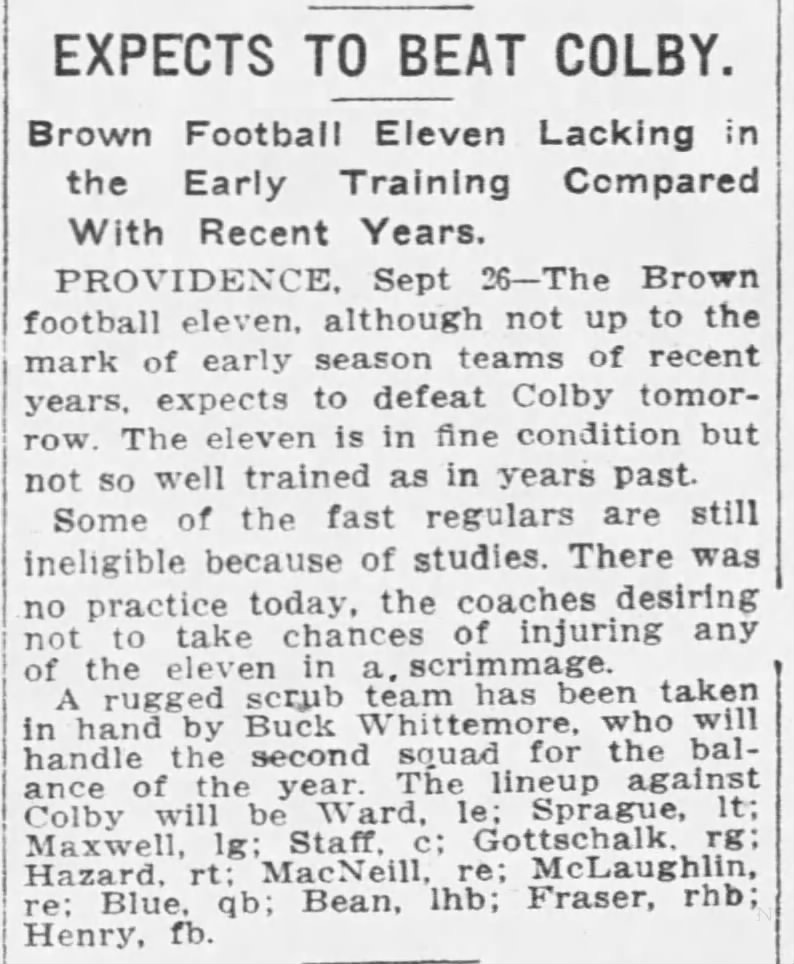Today's Tidbit... Football Can Be So Upsetting
The desire for and celebration of upsets is why March Madness is often magical, and the same happens occasionally in football. The 2024 season has already witnessed an upset or two, with Northern Illinois' takedown of Notre Dame being the most celebrated. Still, upsets occur at all levels. Every year, we see FCS teams beat FBS squads, DIII schools knock off DII, and so on.
The same scenarios occurred in the days when all colleges were created equal, when the NCAA had not yet stratified into divisions. Of course, just as kids playing T-ball know the score of games when the adults do not officially keep track, there were hierarchies among the football-playing schools that everyone understood. People recognized the hierarchies even without rankings, allowing them to acknowledge upsets when they occurred.
One such upset came in 1913 when the Colby Mules visited the Brown Bears and kicked the Ursas in the teeth. Brown is a member of the Ivy League today, and Colby plays in the DIII NESCAC, but the members of those leagues played one another more often before WWI. In 1913, Brown stood a notch below Harvard, Yale, Princeton, Penn, Pitt, Army, and Navy, while Colby hung with Williams, Amherst, and similar schools.
Still, when Colby's team boarded the train on Thursday for their Saturday season opener in Providence, only a few gave them a chance despite losing only 3-0 the year before. With a team numbering almost 40 men, 15 players made the trip for Colby, including five returning starters. The five returnees included both ends, both guards and the left halfback.
Brown returned four starters from the previous season, with a few others missing due to academic problems. Nevertheless, Brown was Brown, and Colby was Colby, so most everyone anticipated a Bruin victory.
Of course, that is why they play the game. Neither team scored in the first half, though Colby seemed to have the better offensive team despite throwing 13 incomplete forward passes and no completions.
Brown's fullback and captain, Dave Henry, kept his team out of danger most of the game with his punting but was part of two significant errors. First, Henry nearly scored on a 30-yard run but dropped the ball near the end zone, only to watch Colby fall on it for a touchback.
A bit later, Colby blocked Henry's punt from the Brown 20-yard line, and Pendergast, one of Colby's veteran ends, fell on it in the end zone for a touchdown. The conversion and a subsequent drop-kicked field goal added four more points for Colby, giving them a 10-point lead they never relinquished.
Word of the upset reached the student body in Waterville, Maine, by telegraph during the dinner hour. Quickly finishing their meals, Colby's students marched with the band around campus, snake dancing and celebrating their big victory until the wee hours of the morning when they met their victorious schoolmates at the train station to celebrate a bit longer.
Colby finished the season 4-2, getting blown out 53-0 by Dartmouth the following Saturday, while Brown ended with a 5-4 record. Still, Colby's victory over Brown made their season and the careers of the 13 players who saw the field that game.
The following spring, Colby's victory over Brown was depicted in a classic yearbook illustration showing the Mules plucking the Brown apple from the tree.
How do you like them apples?
Football Archaeology is reader-supported. Click here to buy one of my books or otherwise support the site.





Upsets will persist forever.
It makes me so happy that even though 100 years have passed, games still swing on blocked punts today. There's something special about the most recent Super Bowl being decided on a punt mishap (on the catch, but close enough), just like games were being decided in 1913.